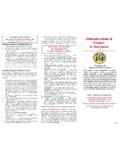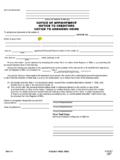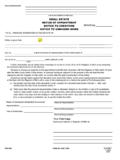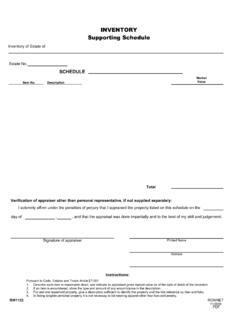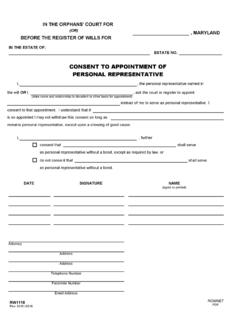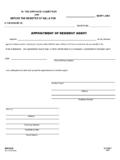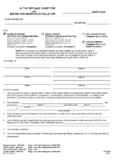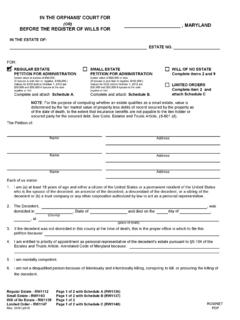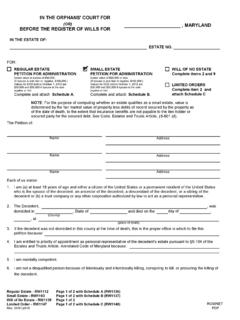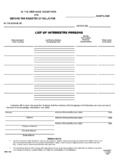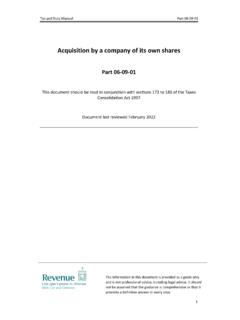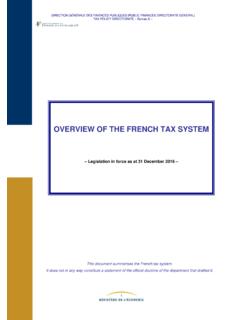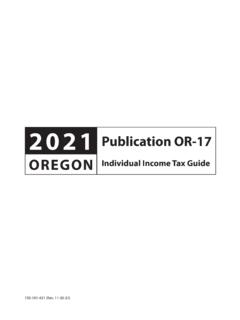Transcription of What you need to know about Maryland’s estate tax
1 What recent legislative changes affect the Maryland estate tax? During the 2012 Legislative Session the Maryland General Assembly enacted the Family Farm Preservation Act of 2012, which adds a new subsection to Title 7 of the Tax-General Article allowing for the exclusion of up to $5,000,000 of the value of qualified agricultural property from the value of the gross estate for decedents dying after December 31, 2011. The new provision also provides that the Maryland estate tax may not exceed 5% of the value of specified agricultural property exceeding $5,000,000. Maryland qualified agricultural exclusion forms may be obtained by calling the estate Tax Unit at (410) 260-7850.
2 Legislation enacted during the 2014 legislative session gradually conforms the Maryland estate tax exemption amount to the value of the unified credit under the federal estate tax, thereby increasing the amount that can be excluded for Maryland estate tax purposes. The increase in the amount that can be excluded for Maryland estate tax purposes is phased over five years and is equal to (1) $ million for a decedent dying in calendar year 2015; (2) $ million for a decedent dying in calendar year 2016; (3) $ million for a decedent dying in calendar year 2017; (4) $ million for a decedent dying in calendar year 2018; and (5) the amount excluded under the federal estate tax for a decedent dying on or after January 1, 2019.
3 Check the Internal Revenue Service website for information on the federal estate tax exemption. Most recently, the Maryland General Assembly enacted legislation during the 2015 legislative session that changed the option allowing Maryland estate tax returns to be filed with the Register of Wills or with the Comptroller. Beginning July 1, 2015, all Maryland estate tax returns must be filed directly with the Comptroller. Requests for certification of the amount of inheritance paid on behalf of a decedent will be made by the Comptroller only; such certification requests should no longer be made by the personal representative of the decedent s estate or any other person required to file a Maryland estate tax return with regard to property passing from the decedent.
4 Rev. 5/19 FOR ADDITIONAL INFORMATION: call the Comptroller of Maryland at 410-260-7850 (Central Maryland) 1-800-MD TAXES (from elsewhere in Maryland) 8:00 to 5:00 eastern time E-mail: web site: forms and publications fill out the interactive Combined Registration Application online to register new business tax accounts see if you are among the owners of millions in unclaimed funds tax regulations Hearing impaired individuals may call: Maryland Relay Service (MRS) 711 If you need a reasonable accommodation for a disability, please contact us before your visit What you need to know about Maryland s estate tax M A R Y L A N D T A X T I P 42 Peter Franchot Registers of Wills Allegany.
5 301-724-3760 toll-free .. 1-888-724-0148 Anne Arundel .. 410-222-1430 toll-free .. 1-800-679-6665 Baltimore City .. 410-752-5131 toll-free .. 1-888-876-0035 Baltimore .. 410-887-6680 toll-free .. 1-888-642-5387 Calvert .. 410-535-0121 toll-free .. 1-888-374-0015 Caroline .. 410-479-0717 toll-free .. 1-888-786-0019 Carrol .. 410-848-2586 toll-free .. 1-888-876-00344 Cecil .. 410-996-5330 toll-free .. 1-888-398-0301 Charles .. 301-932-3345 toll-free .. 1-888-256-00544 Dorchester .. 410-228-4181 toll-free .. 1-888-242-6257 Frederick .. 301-600-6565 toll-free .. 1-888-258-0526 Garrett .. 301-334-1999 toll-free .. 1-888-334-2203 Harford .. 410-638-3275 toll-free .. 1-888-258-0525 Howard.
6 410-313-2133 toll-free .. 1-888-848-0136 Kent .. 410-778-7466 toll-free .. 1-888-778-0179 Montgomery .. 240-777-9600 toll-free .. 1-888-892-2180 Prince George s .. 301-952-3250 toll-free .. 1-888-464-4219 Queen Anne s .. 410-758-0585 toll-free .. 1-888-758-0010 St. Mary s .. 301-475-5566 toll-free .. 1-888-475-4821 Somerset .. 410-651-1696 toll-free .. 1-888-758-0039 Talbot .. 410-770-6700 toll-free .. 1-888-822-0039 Washington .. 301-739-36122 toll-free .. 1-888-739-0013 Wicomico .. 410-543-6635 toll-free .. 1-888-786-0018 Worcester .. 410-632-1529 toll-free .. 1-888-256-0047 What is the Maryland estate tax? What is the rate? The Maryland estate tax is a transfer tax imposed on the transfer of assets from an estate .
7 It is based on the maximum credit for state death taxes allowable under 2011 of the Internal Revenue Code. The credit used to determine the Maryland estate tax cannot exceed 16% of the amount by which the decedent s taxable estate exceeds the Maryland estate tax exemption amount for the decedent s year of death. Note: For decedents dying after December 31, 2001, the maximum allowable credit for state death taxes will not be reduced, for purposes of the Maryland estate tax, by any act of Congress enacted on or after January 1, 2001. What about the inheritance tax? The inheritance tax is a separate tax collected by the Register of Wills located in the county where the decedent either lived or owned property.
8 The tax is imposed on the clear value of property that passes from a decedent to some certain beneficiaries. It is levied on property that passes under a will, the intestate laws of succession, and property that passes under a trust, deed, joint ownership, or otherwise. For more information, contact the Office of the Register of Wills. What if Maryland inheritance and estate taxes are both due? Isn t that double taxation? The inheritance tax paid to the Register of Wills is subtracted from the gross Maryland estate tax liability and the difference is the Maryland estate tax due. If the inheritance tax paid is equal to or exceeds Maryland's determination of the credit for state death taxes, no Maryland estate tax is due.
9 However, the Maryland estate tax is owed and due until the inheritance tax is actually paid. If the amount of inheritance tax paid to the Register of Wills on or before the due date of the Maryland estate tax is less than the gross Maryland estate tax liability, interest and/or penalty will be assessed on the outstanding liability. Interest will continue to accrue until the inheritance tax paid equals or exceeds the outstanding estate tax liability. See Comptroller of the Treasury v. Jameson, 332 Md. 723, 633 93 (1993). For example, estate owes $150,000 of estate tax, due by the nine (9) month statutory due date of January 1, 2014.
10 estate made two $75,000 payments of inheritance tax, one on December 1, 2013, and one on February 1, 2014. Because only $75,000 was paid by the estate tax due date, interest will be due on the remaining $75,000 from January 1, 2014 through February 1, 2014 when the amount of inheritance tax paid to the Register of Wills equaled the Maryland estate tax liability. Who is responsible for filing the Maryland estate tax return? The duly appointed personal representative of the decedent's estate must file the return. If there is more than one personal representative, the return must be made jointly by all. If there is no personal representative appointed, every person in actual or constructive possession of any property of the decedent is required to make and file a return.
